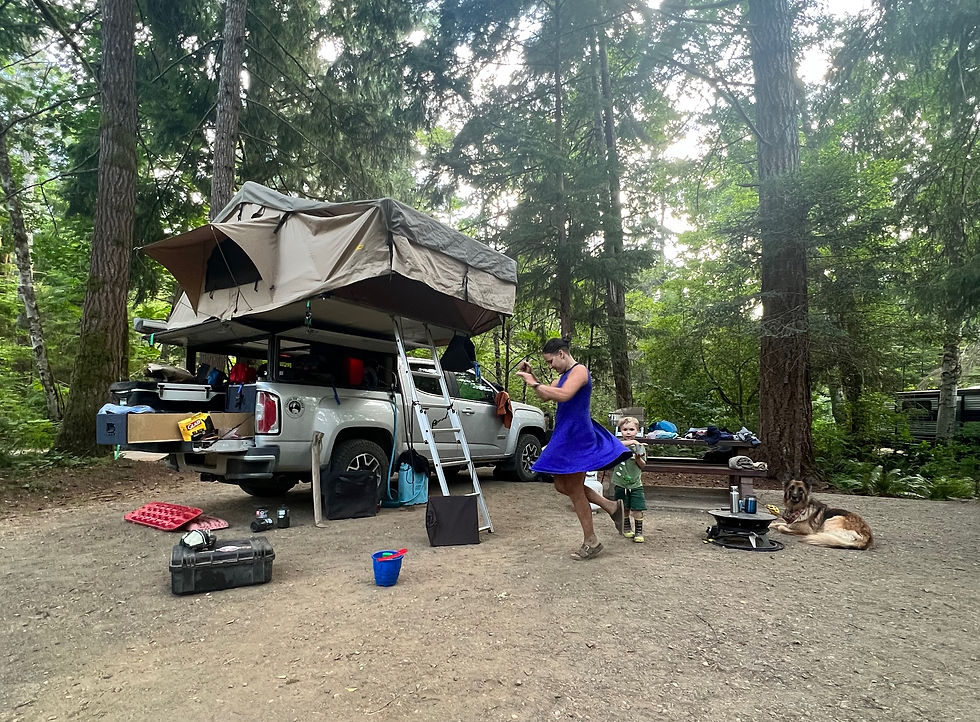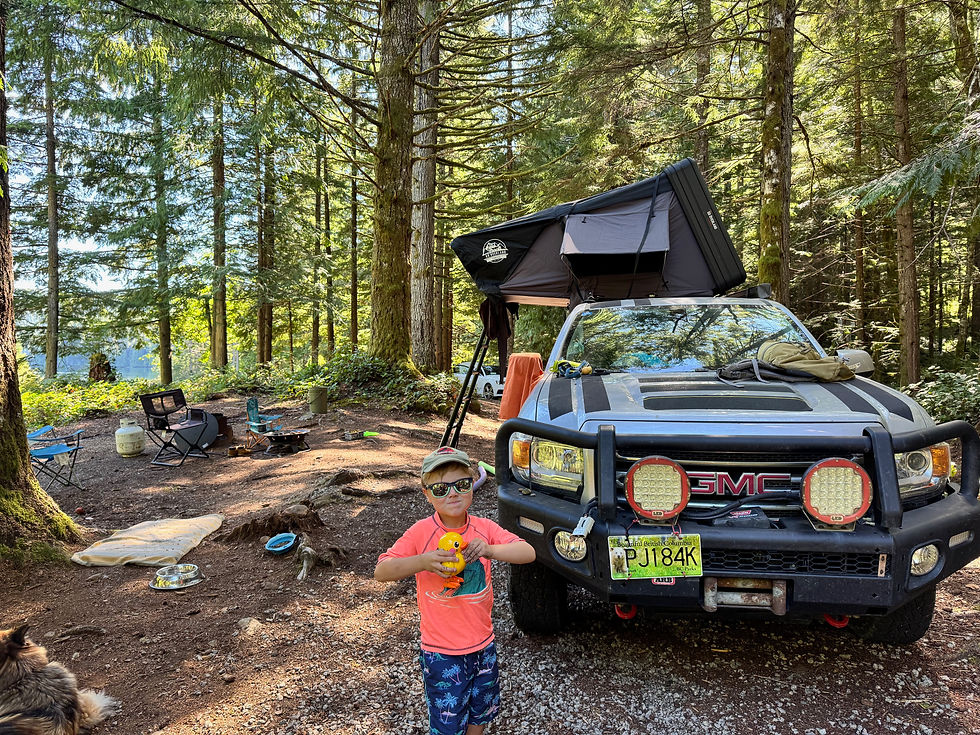Welcome back to this week’s Sunday story! We took last week off so that we could enjoy the final long weekend of the summer and what did we do with our time? Well, you probably guessed it already - we went on a road trip and lived out of our truck! This week’s Sunday Story is all about a key element of living in small spaces that can have a profoundly positive impact on your leadership: the awareness that you don’t need a lot.
Our space is small all the time - when on an adventure, our load out is pretty sparse. We each get one bag, and that has to contain all of our things: clothes, toiletries, warm layers, swim gear, etc. The truck itself is pretty much full with food and the necessary equipment to get ourselves out of trouble and to live comfortable off grid. The tent is the equivalent of a King-sized bed, and is room enough for two adults, a child, a German shepherd dog, and an occasional cat, and our fold-out awning room is our only other “indoor” space at a palatial 8 feet by 8 feet. All told, we live for weeks at a time with about 100 square feet, bed included.
And when not on an adventure, we still live tiny. We’ve eschewed the traditional house in a suburbs for an 18-foot-long trailer that we park by the ocean. It’s a single room, with a small kitchen and dinette area and some bunk beds at the back for our child. This space is about 140 square feet all told, bed included.

Just last week, we passed our two year anniversary living this way, and apart from some minor tweaks we’d make if we were to do this all again, substantively we wouldn’t want to be anywhere else. We’re not just surviving - we’re thriving.
As a family, existing in a maximum of 140 square feet year-round has been profoundly beneficial - we’re closer (and not just physically), and spend way more time connecting. In our “house days”, one of us would be in the office doing work behind a closed door, the other in the kitchen prepping the week’s meals, and our kid might be reading books or playing with toys in his bedroom. The activities are all the same, but we do them in the same space - which means we can engage with the books my son reads; my wife can chat to me while I work and she preps for the week ahead. We also consume a lot less - when you’ve got nowhere to put stuff, you tend not to buy stuff. And, with less stuff, we have less obligations to that stuff - when our friends are spending weekends cleaning their garage or doing yard work, we’re out having fun and experiencing the world around us.

The lessons we’ve learned from living small have can have a huge impact on your leadership, but for this article, here are the top three:
1) You don’t need a lot. Leadership isn’t about a title, or an office, or a budget. Often, leadership shows up in the absence of those things. The reason this is important to keep in mind is that imposter syndrome - something that impacts about 70% of leaders - feeds off of a person’s insecurity about what they “need”. When you look around your LinkedIn feed and see leaders with fancy titles, big teams, sizeable budgets, or popular products and services, it’s easy to start feeling that these observable things are somehow a part of leadership. But they are not at all. Leadership is about bringing people together and helping them collaborate effectively to achieve goals. It’s about helping people be their best self and show up in the best way. It’s not about how fancy you look or appear while doing it - nothing could be less relevant.
Leadership isn’t about what you have. It’s about what you do when working with others.
2) When in doubt, simplify the objectives. We’ve spent a lot of time with complex camping gadgets that promise to wash clothes or deter bugs or charge phones while cooking food and any number of other innovations. We’ve learned over the years that the more complex a thing is, the less likely we are to make use of it, and when living in a small space, we can’t afford to give up cubic inches of volume for things we aren’t using. So, our mantra has been simplicity - what is it, essentially, that we are trying to do?
When we look at it that way, all of a sudden the idea of a stove that charges our phones becomes silly. We might not even need our phones at all, let alone a complex stove to plug them into! All we really need is access to money for gas and food, a place to sleep, a way to acquire clean water, and a way to call for help. Those are relatively simple things, and we can achieve them with just 4 pieces of kit - a bank card, a tarp, a LifeStraw filter, and a Garmin InReach. I wouldn’t even need a backpack to bring the stuff I truly “need” with me on an adventure. (of course, I still bring one - start simple, but don't be shy about adding reasonable extra items for the sake of your comfort or sanity!)
Sometimes our leadership practice starts looking at problems and we end up leaning more towards solutions that are akin to the phone-charging-stove, rather than stopping and asking ourselves if we really need that at all. Taking a step back and simplifying the objectives is a phenomenally beneficial process for leaders to go through. It can help you sort through the noise and distractions and gives you the chance for some “clean slate” thinking on a problem. If you encounter a leadership challenge, and are able to remind yourself to take a beat and identify the most important, simple objectives that you need to achieve, you may find that your plan becomes a lot easier to execute as well.
3) Not every adventure has to be a complex expedition. When you get used to living small, your needs tend to be met all the time almost no matter where you are. There’s a freedom in this, because it means we have the capability and capacity to adventure anywhere in the world at any time, funds permitting. Whether I’m living out of my backpack and a truck in Bangkok or Burlington, my experience is pretty consistent when it relates to my basic needs, and there’s a lot of freedom in that. But more than freedom, there is enjoyment in the process of this experience - I find quite a bit of joy living small and simple, so much so that now it doesn’t even matter where we go. Don’t get me wrong, we’ve seen some epic places (and you can see some of them at www.chasingourtrunks.com), but we’re just as happy driving 30 minutes from where we live to find a random creek down a logging road.
Your leadership is like this too. Not every project or challenge is going to be something epic that defines your leadership career, and it doesn’t have to be. If you can refine your leadership practice so that your approach - your leadership version of “living out of a truck and backpack” - is consistent in a wide variety of contexts, you’ll find that your leadership in an of itself becomes the thing you find joy in, irrespective of the overall project. To put this into real terms: As a leader, one of my most rewarding experiences is when someone I lead sets a goal and achieves it. It doesn’t matter to me if that’s a student leader trying to ace a midterm or a mid-level manager trying to deliver a multi-million dollar project - for me, when I see either of them be successful, I feel like a successful leader, regardless of what their success is.
The best way I’ve found to create a consistent leadership frame is to identify my core values, and to be explicit about how I use them to guide my leadership (as we’ve written before, leading from values is the best way to create trust, safety, and high functioning teams). Sometimes, the most rewarding leadership moments aren’t even great stories - they are often times when you look back on something unfancy, unflashy, and underwhelming to most observers, but you know how your people flexed, grew, and achieved to make it happen. Memories like this are the ones I smile most at when they come to mind, even years alter.

Living small and minimalist isn’t the only thing you need to do to be a great leader - and candidly, it won’t work for everyone. But the lessons we’ve learned from living small can certainly apply to your practice. Remind yourself that you don’t need a lot, to simplify the objectives to reset how you think about them, and don’t expect everything to be epic, and you’ll find your leadership flourishes.
Next week, we’ll talk about the final and most important part of the Leadership Road Trip series: Taking care of yourself first! Thanks for reading, and we’ll see you next Sunday.
Comments